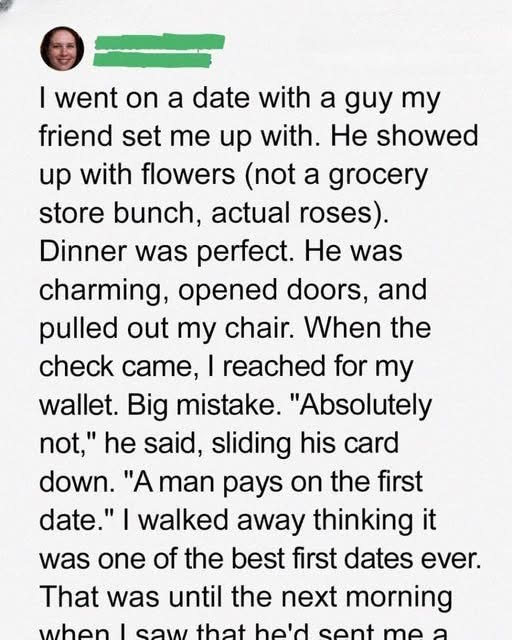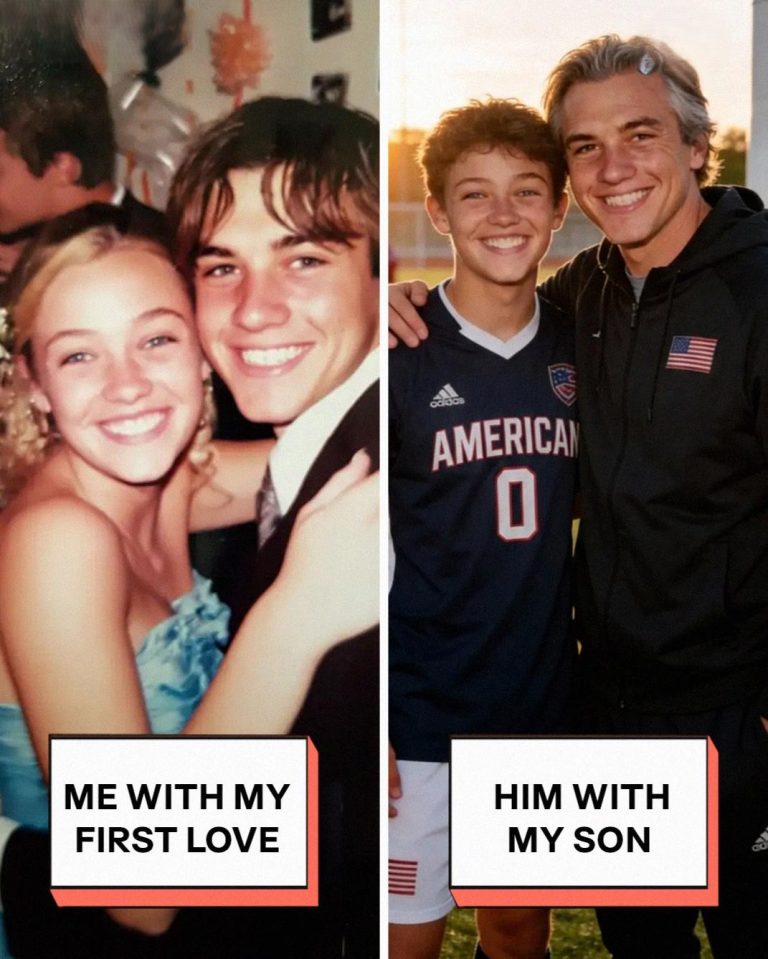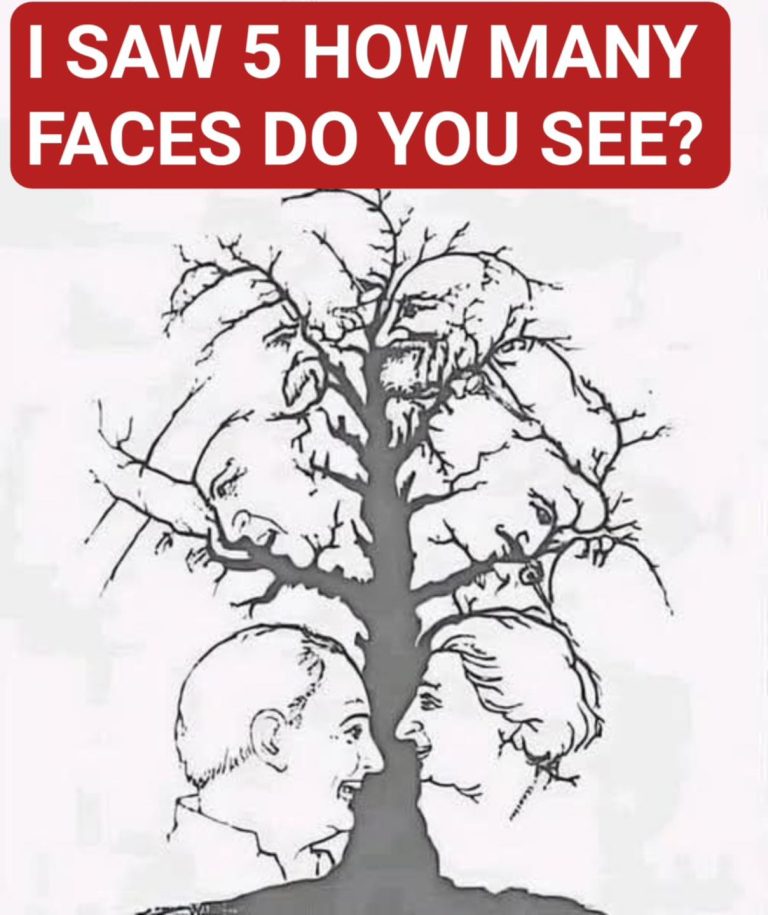
I went on a date with a guy my friend set me up with.
He showed up with flowers — not a grocery store bunch, but actual roses. Dinner was perfect. He was charming, opened doors, and even pulled out my chair.
When the check came, I reached for my wallet.
Big mistake.
“Absolutely not,” he said, sliding his card down. “A man pays on the first date.”
I walked away thinking it was one of the best first dates I’d ever had.
That was until the next morning…
When I woke up, I saw that he’d sent me a message. It started sweet: “Had a wonderful time last night. You’re amazing.”
But then, as I kept reading, my smile faded.
He continued:
“By the way, I noticed you didn’t say thank you when I paid. It’s okay, maybe you just forgot. I value appreciation, so I thought I’d mention it. Also, I prefer when women don’t talk too much about work — it’s a bit intimidating. I like a more feminine vibe.”
I just stared at my screen.
Was this the same man who held doors and gave me roses?
I brushed it off, trying to give him the benefit of the doubt. Maybe he was just awkward. But something about his tone didn’t sit right.
Later that afternoon, he texted again.
“I’d love to see you tonight. I’ll pick you up at 7. Wear something classy — maybe a dress. I’m not into girls who wear jeans on dates.”
That was the moment a little voice in my head whispered, Something’s off.
Still, curiosity (and maybe a bit of hope) got the best of me. I agreed to meet him again.
When he arrived, he complimented me, but it felt… rehearsed.
At dinner, he talked about himself — his job, his car, his “standards.” Whenever I tried to share something, he’d smile and interrupt with a story about how he would’ve done it better.
By dessert, I was drained.
Then came the final straw.
As we walked to his car, a homeless man asked if we could spare a dollar. Without hesitation, I pulled some change from my purse and handed it over.
The man smiled softly, “Thank you, miss. God bless.”
But my date? He scoffed.
“You shouldn’t encourage people like that,” he muttered. “They need discipline, not handouts.”
I stopped walking. That was it.
The perfect image of the gentleman shattered right there on the sidewalk.
I told him I’d call an Uber and go home.
He frowned. “Don’t be dramatic,” he said. “I’m just saying, people need to work for what they get. You women get too emotional over everything.”
“Goodnight,” I said, stepping away.
That night, I blocked his number.
Two days later, I got a call from my friend — the one who had set us up.
“You’re not going to believe this,” she said, her voice trembling. “He’s been messaging other women — saying the same lines. Flowers, dinners, everything. He’s basically running some kind of… experiment.”
“Experiment?” I asked.
“Yeah. He told one of my coworkers he’s writing a book about how easily women fall for chivalry. He records the dates — audio, sometimes even video.”
My stomach dropped.
I remembered his phone being face-up on the table all night, screen glowing. I thought he was just checking messages.
He wasn’t.
The next morning, I marched straight to the café where we’d had our first date. I asked to speak to the manager.
He confirmed it. The guy — “Ethan” — had asked for a corner seat near a wall outlet. He’d even mentioned “documenting reactions for a project.”
I felt sick.
But instead of rage, something colder settled in me: determination.
Over the next few weeks, I found other women — through mutual friends and social media — who had gone out with him too. Same flowers. Same lines. Same fake charm.
Together, we shared stories and evidence. One woman even found her voice recorded in the background of a “social experiment” podcast he was planning to post.
So, we decided to give him a taste of his own medicine.
We created a fake dating profile. The woman in the photos wasn’t real — a blend of AI images and light editing. Her bio?
“Loves roses. Believes in old-fashioned gentlemen. Hates women who complain about paying the bill.”
We knew it would catch his eye.
Within a day, he messaged. Within a week, he asked her out.
And when he arrived at the restaurant, dressed in his usual “perfect date” outfit — a crisp white shirt, blazer, and smug grin — he was met not by one woman, but six.
All of us.
Every woman he had tried to manipulate.
He froze.
I stood up first and said, “You wanted reactions? Here’s one.”
The color drained from his face.
He muttered something about a “misunderstanding” and hurried out. The café went quiet, but I swear I saw a few people clapping as he left.
A few weeks later, someone sent me a link.
His “experiment” podcast was gone. His accounts were deleted. Turns out, once people started commenting on his behavior online, his reputation in the local dating scene burned faster than a match to paper.
Looking back, I realized something.
He thought he was studying women — testing our kindness, our reactions, our emotions. But in the end, it wasn’t us he exposed.
It was himself.
Because pretending to be a gentleman doesn’t make you one. Respect does.
And as for me? I still believe in romance. I still believe there are good men out there — ones who open doors not for show, but out of genuine kindness.
But now, when I see roses, I don’t just think of beauty. I think of thorns too — and how sometimes, the prettiest bouquet hides the sharpest sting.



